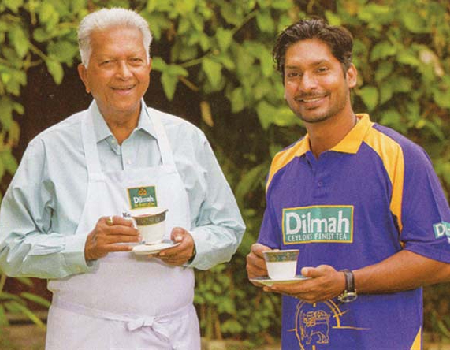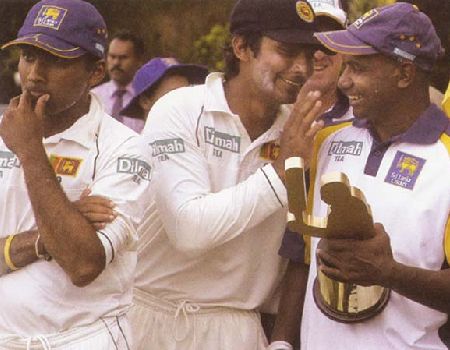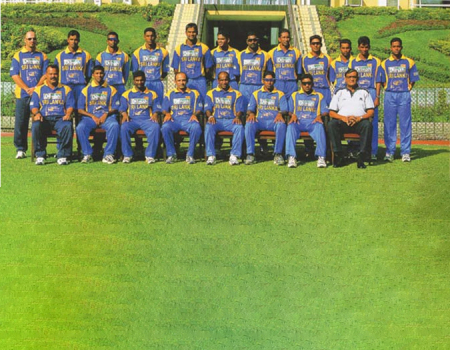
Please Share your Email if you Wish to Receive the Golden Tips & Tales Newsletter from History of Ceylon Tea Website



Ian Healy, former Australian wicketkeeper,
once said, A game with so many tea breaks
in it deserves Dilmah! It makes perfect sense
Our Sri Lankan cricket team stunned the cricketing world when they won the One Day Cricket World Cup in 1996, defeating the more fancied Australian team in the final.
Whilst at that time, along with the rest of the country, I rejoiced in exploits of our cricketers, especially explosive batsmen like Sanath Jayasuriya and Romesh Kaluwitharana, the thought of associating Dilmah with cricket, or any other sport, had not occurred to me. Clearly, cricket had become the number one sport in Sri Lanka and one in which we could compete on equal terms with the best that the rest of the world could offer. Our World Cup victory proved that. So perhaps it did make sense to link that sport with Ceylon Tea, which is the islands premier export and that which identifies this country globally.
The internationally-acclaimed association between tea and Ceylon preceded the cricketing link by many decades, although over the years the early British planters did much to popularize the game across the many planting districts of Ceylon. All those arguments apart, there was the fact that with its outreach across close upon 100 countries then, Dilmah had become the global image of Pure Ceylon Tea.
Eventually, when I allowed myself to be persuaded by Malik and Himendra to approve the sponsorship, I also saw the logic in establishing a connection between Dilmah and Ceylon Cricket. The paths they had travelled were similar, despite simple beginnings going on to scale world heights, against seemingly-insurmountable odds.
SPONSORING THE NATIONAL TEAM
Our partnership began in 2001 and we signed on for a three-year term. Dilmah was the first totally home-grown company to sponsor Sri Lanka Cricket, previously supported by multinationals like Singer and Coca-Cola.
It was a fruitful alliance. At that time Dilmah had considerable market share in Australia, New Zealand, and Russia. Dilmah was also selling in about 80 other countries, including all the Test cricket playing nations and those aspiring to do so. We saw cricket as a key part of our marketing strategy, to make a bigger impact in some of those countries where we were already selling, but without the dominance and market visibility we enjoyed in Australia and New Zealand.
The sponsorship was also a cost-effective way of advertising Dilmah in cricket-mad India, the single country in all the world with the highest tea consumption, as well as the largest and, unarguably, the most fanatical collection of cricket fans. With the brilliant synergy Dilmah and our cricketers created, the Dilmah logo and the special brand of cricket our boys, played was exposed to millions of viewers in Asia and many countries in Europe.
In tea and cricket, British legacies both, the local inheritors had overtaken the founding fathers in international outreach and competitiveness, in a very short time becoming forces to be reckoned with – one in the global market place and the other in international cricket.
We followed the first collaboration with a second sponsorship, which lasted till 2008. Since then Dilmah and Sri Lanka cricket have moved on separately, that first World Cup win having propelled our cricket centre stage in the global arena. Despite fluctuating fortunes, our cricket is still a competitive force internationally.
The Dilmah influence on Sri Lanka cricket is still visible though, even after a very cordial disengagement of the official relationship more than a decade ago. Many countries still continue to associate Dilmah and Sri Lanka cricket; unsurprising, as even today in international fixtures between Sri Lanka and other countries, there are enthusiastic groups of lion flag-waving expatriate Sri Lankan supporters clad in the signature blue Dilmah shirt with yellow highlights, cheering the home side on. The Dilmah-Sri Lanka Cricket bond has outlasted the formal sponsorship deal.
Another useful outcome of the Dilmah-Sri Lanka Cricket association was that it placed our `Dilmah brand, which had primarily been an export-oriented brand, firmly in the public consciousness in Sri Lanka. In the promotion of Dilmah as a locally-owned international brand, the local market had been a secondary consideration. Concurrent with the Dilmah sponsorship of Sri Lanka Cricket, we were able to launch a serious marketing promotion of Dilmah within the country as well. Since then, Dilmah tea has been featured prominently in most supermarkets and shops in Sri Lanka.
Pursuing the Dilmah nexus with Sri Lanka Cricket, in 2016 we signed up Kumar Sangakkara as our Brand Ambassador in India. Given the Dilmah commitment to ethical business, philanthropy, and conservation, and Kumar's impeccable reputation as both a sportsman and an individual of absolute integrity, selecting him as our Brand Ambassador was both natural and logical.
As Dilmah has done with Pure Ceylon Tea, establishing an image for quality and authenticity worldwide, for many years Kumar has provided the same service for Sri Lanka cricket, as its eloquent voice, both on the field and outside. An example is his sublime MCC, Spirit of Cricket — Colin Cowdrey speech at Lords, which will be long remembered for its depth, variety, and richness, especially its fearless and unbiased exploration of crucial national issues, outside the game.
CRICKET AS AN ENABLER
In 2005 the MJF Charitable Foundation, in collaboration with the Sri Lanka Association for the Visually Handicapped (SLCAVH), sponsored the National Cricket of the Blind (NCAB) tournament, the only such platform in Sri Lanka for the visually handicapped. This annual competition, involving several teams from different parts of the island, enables the selection of the National Team to represent Sri Lanka at the Blind Cricket World Cup, held once every four years.
In January 2018, Dilmah sponsored Sri Lanka's National Team for the Blind Cricket World Cup held in Ajman, UAE. The competitive spirit generated by these handicapped players is an example to the fully-abled. Another worthy initiative was the Joint Venture between the MJF Charitable Foundation and the Cricket Live Foundation (CLF) of New Zealand, designed to provide cricket coaching for less privileged children, using cricket as a pathway for a better future. This project was the result of our collaboration with Mike Dormer of New Zealand, business associate and friend, and founder of the Willows Cricket Club, Christchurch.
Comments
(In keeping with the objectives of this website, all COMMENTS must be made in the spirit of contributing to the history of this estate, planter or person i.e. names, dates & anecdotes. Critical evaluations or adverse comments of any sort are not acceptable and will be deleted without notice – read full Comments Policy here)